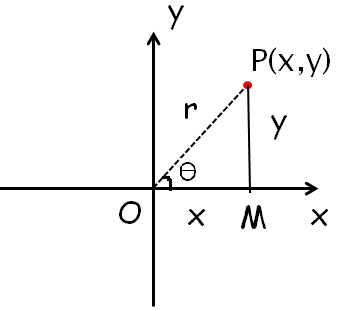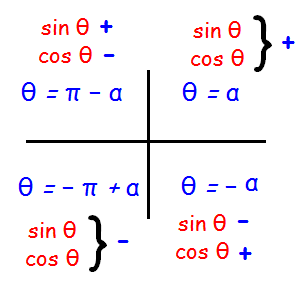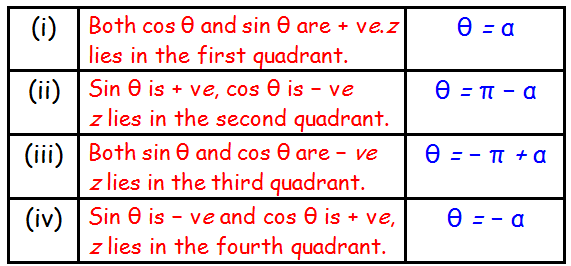FIND THE MODULUS AND ARGUMENT OF A COMPLEX NUMBER
Subscribe to our ▶️ YouTube channel 🔴 for the latest videos, updates, and tips.
Find the modulus and argument of a complex number :
Let (r, θ) be the polar co-ordinates of the point.
P = P(x, y) in the complex plane corresponding to the complex number
z = x + iy

cos θ = Adjacent side/hypotenuse side ==> OM/MP ==> x/r
sin θ = Opposite side/hypotenuse side ==> PM/OP ==> y/r
x = r cos θ and y = r sin θ
Where r = √(x²+ y² )
|x + iy | is called the modulus or the absolute value of
z = x + iy denoted by mod z or | z | (i.e., the distance from the origin to the point z)
tan θ =y/x
θ = tan−1 y/x
is called the amplitude or argument of z = x + iy
denoted by amp z or arg z and is measured as the angle which the line OP makes with the positive x-axis (in the anti clockwise sense).
How to find argument of complex number
Usually we have two methods to find the argument of a complex number
(i) Using the formula θ = tan−1 y/x
here x and y are real and imaginary part of the complex number respectively.
This formula is applicable only if x and y are positive.
But the following method is used to find the argument of any complex number.


To find the modulus and argument for any complex number we have to equate them to the polar form
r (cos θ + i sin θ)
Here r stands for modulus and θ stands for argument
Let us see some example problems to understand how to find the modulus and argument of a complex number.
Find the modulus and argument of a complex number - Examples
Example 1 :
Find the modulus and argument of the complex number
- √2+i√2
Solution :
-√2 + i√2 = r (cos θ + i sin θ) ----(1)
Finding modulus :
r = √ [(-√2)² + √2²]
r = √(2 + 2)
r = √4
r = 2
Finding Argument :
Apply the value of r in the first equation
- √2 + i√2 = 2(cos θ + i sin θ)
- √2+i√2 = 2 cos θ + i 2 sin θ
Equating the real and imaginary parts separately
|
2 cos θ = - √2 cos θ = - √2/2 cos θ = - 1/√2 |
2 sin θ = √2 sin θ = √2/2 sin θ = 1/√2 |
Since sin θ is positive and cos θ is negative the required and θ lies in the second quadrant.
θ = Π - α
Here α is nothing but the angles of sin and cos for which we get the value 1/√2
θ = Π - (Π/4)
θ = (4Π-Π)/4 ==> 3Π/4
Modulus = 2 and argument = 3Π/4
Hence - √2 + i √2 = 2 (cos 3Π/4 + i sin 3Π/4)
Example 2 :
Find the modulus and argument of a complex number
1 + i √3
Solution :
1 + i √3 = r (cos θ + i sin θ) ----(1)
Finding modulus :
r = √ [(1)² + √3²] = √(1 + 3) = √4 = 2
r = 2
Finding Argument :
Apply the value of r in the first equation
1 + i√3 = 2 (cos θ + i sin θ)
1 + i√3 = 2 cos θ + i 2 sin θ
Equating the real and imaginary parts separately
|
2 cos θ = 1 cos θ = 1/2 |
2 sin θ = √3 sin θ = √3/2 |
Since sin θ and cos θ are positive, the required and θ lies in the first quadrant.
θ = α
Here α is nothing but the angles of sin and cos for which we get the values 1/2 and √3/2 respectively.
θ = Π/3
Modulus = 2 and argument = Π/3
Hence - √2 + i √2 = 2 (cos Π/3 + i sin Π/3)
Example 3 :
Find the modulus and argument of the complex number
-1 - i√3
Solution :
-1 - i √3 = r (cos θ + i sin θ) ----(1)
Finding modulus :
r = √ [(-1)2 + (-√3)2]
r = √(1 + 3)
r = √4
r = 2
r = 2
Finding Argument :
Apply the value of r in the first equation
-1 - i √3 = 2 (cos θ + i sin θ)
-1 - i √3 = 2 cos θ + i 2 sin θ
Equating the real and imaginary parts separately
|
2 cos θ = -1 cos θ = -1/2 |
2 sin θ = -√3 sin θ = -√3/2 |
Since sin θ and cos θ are negative the required and θ lies in the third quadrant.
θ = -Π + α
Here α is nothing but the angles of sin and cos for which we get the values √3/2 and 1/2 respectively.
θ = - Π + α
= -Π + Π/3 ==> (-3Π+Π)/3 ==>-2Π/3
Modulus = 2 and argument = -2Π/3
Hence - 1 - i √3 = 2 (cos (-2Π/3) + i sin (-2Π/3))
Example 4 :
Find the modulus and argument of the complex number
(√3+i)/(√3-i)
Solution :
Finding modulus :
|(√3+i)/(√3-i)| = [√(√3)2+12]/[√(√3)2+(-1)2]
= √4/√4
= 1
Finding Argument :
arg((√3+i)/(√3-i)) = arg(√3+i) - arg(√3-i)
= tan-1(1/√3) - tan-1(-1/√3)
= Π/6 - (-Π/6)
= Π/3
So, modulus is 1 and argument is Π/3.
Example 5 :
Find the modulus and argument of the complex number
-2/(1+i√3)
Solution :
Finding modulus :
|-2/(1+i√3)| = |-2|/[√12+(√3)2]
= 2/√4
= 1/2
arg(-2/(1+i√3)) = arg(-2) - arg(1+i√3)
Finding Argument :
We can consider -2 as -2+i0
= tan-1(0/2) - tan-1(√3/1)
= 0 - Π/6
= -Π/6
So, modulus is 1/2 and argument is -Π/6.
Subscribe to our ▶️ YouTube channel 🔴 for the latest videos, updates, and tips.
Kindly mail your feedback to v4formath@gmail.com
We always appreciate your feedback.
About Us | Contact Us | Privacy Policy
©All rights reserved. onlinemath4all.com

Recent Articles
-
SAT Math Problems and Solutions
Feb 14, 26 06:05 AM
SAT Math Problems and Solutions -
SAT Math Practice Questions with Answers
Feb 14, 26 05:47 AM
SAT Math Practice Questions with Answers -
SAT Math Practice Test with Answers
Feb 14, 26 02:30 AM
SAT Math Practice Test with Answers

